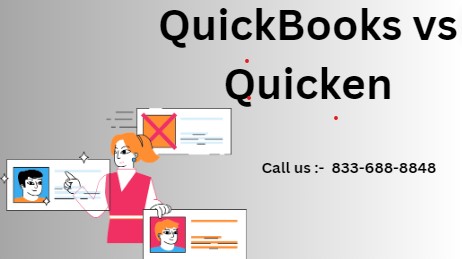When it comes to managing your finances, choosing the right software can make a significant difference. Two of the most popular financial management tools on the market are QuickBooks and Quicken. While both are developed by Intuit, they cater to different audiences and serve distinct purposes. In this blog, we’ll compare QuickBooks and Quicken, highlighting their key features, differences, and the scenarios where each tool excels.
Overview of QuickBooks
QuickBooks is a robust accounting software primarily designed for small to medium-sized businesses. It offers a wide range of features that help businesses manage their finances, including:
- Invoicing and Payments: QuickBooks allows businesses to create professional invoices, track payments, and send reminders to clients. It also supports online payments, making it easier to get paid faster.
- Expense Tracking: With QuickBooks, you can easily track business expenses, categorize them, and even upload receipts directly into the system.
- Payroll Management: QuickBooks provides comprehensive payroll management, allowing businesses to pay employees, calculate taxes, and manage benefits with ease.
- Financial Reporting: QuickBooks generates detailed financial reports, including profit and loss statements, balance sheets, and cash flow statements. These reports provide valuable insights into the financial health of a business.
- Tax Preparation: QuickBooks simplifies tax preparation by organizing all financial data in one place, making it easier to file taxes accurately and on time.
Overview of Quicken
Quicken, on the other hand, is designed for personal finance management. It’s ideal for individuals and families who want to track their personal finances, budget, and plan for the future. Key features of Quicken include:
- Budgeting: Quicken offers powerful budgeting tools that allow users to set up and track their monthly budgets, ensuring they stay on top of their spending.
- Expense Tracking: Quicken automatically categorizes expenses, helping users understand where their money is going and identify areas where they can save.
- Investment Tracking: Quicken provides tools to track investments, monitor performance, and manage portfolios. It also offers insights into net worth and future financial projections.
- Bill Management: Quicken helps users manage and pay bills on time, avoiding late fees and keeping their finances organized.
- Debt Reduction Planning: For those looking to pay off debt, Quicken offers tools to create a debt reduction plan, track progress, and achieve financial freedom.
Key Differences Between QuickBooks and Quicken
- Target Audience:
- QuickBooks: Best suited for small to medium-sized businesses that need comprehensive accounting and financial management tools.
- Quicken: Ideal for individuals or families looking to manage personal finances, budgeting, and investments.
- Features:
- QuickBooks: Offers advanced features such as payroll management, inventory tracking, and business tax preparation.
- Quicken: Focuses on personal finance features like budgeting, investment tracking, and debt reduction.
- Complexity:
- QuickBooks: More complex due to its extensive range of features tailored for business needs. It may require some accounting knowledge to use effectively.
- Quicken: Easier to use, with a focus on simplicity and user-friendly tools for managing personal finances.
- Pricing:
- QuickBooks: Typically more expensive, with pricing plans based on the level of features and the number of users.
- Quicken: More affordable, with a range of plans to suit different personal finance needs.
- Usage Scenarios:
- QuickBooks: Perfect for businesses that need to manage invoices, payroll, expenses, and financial reports.
- Quicken: Best for individuals who want to keep track of their personal budget, investments, and bills.
Which One Should You Choose?
The choice between QuickBooks and Quicken ultimately depends on your needs:
- If you’re a business owner: QuickBooks is the clear choice. Its comprehensive features for managing business finances, payroll, and taxes make it an essential tool for any business.
- If you’re managing personal finances: Quicken is the better option. Its intuitive tools for budgeting, tracking expenses, and managing investments are designed to help individuals stay on top of their personal finances.
Conclusion
Both QuickBooks and Quicken are powerful tools in their respective domains. QuickBooks is indispensable for businesses looking to streamline their accounting processes, while Quicken is perfect for individuals seeking to manage their personal finances effectively. By understanding the key differences and features of each, you can choose the right tool to meet your financial management needs.
Read More : Accounting and Bookkeeping Services



